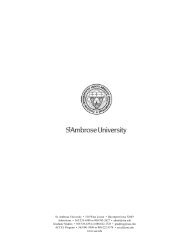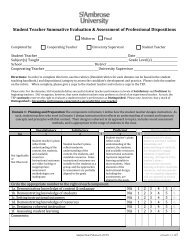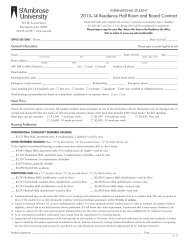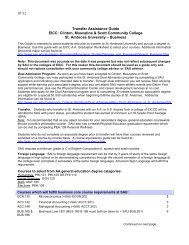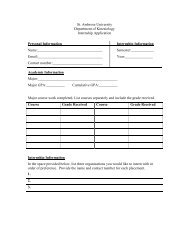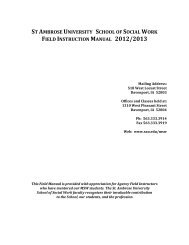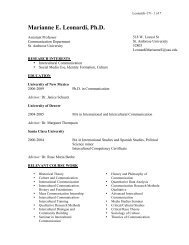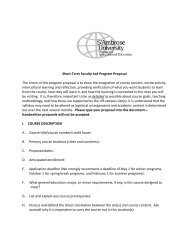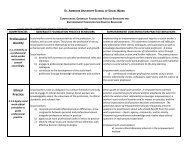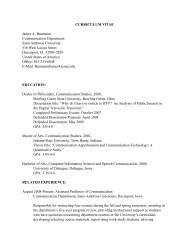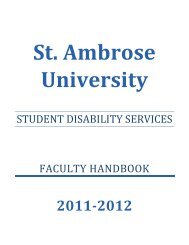St. Ambrose University 518 West Locust Davenport Iowa 52803 admit
St. Ambrose University 518 West Locust Davenport Iowa 52803 admit
St. Ambrose University 518 West Locust Davenport Iowa 52803 admit
You also want an ePaper? Increase the reach of your titles
YUMPU automatically turns print PDFs into web optimized ePapers that Google loves.
Undergraduate Programs<br />
IE 335. Quality Control and Reliability 3 credits<br />
Introduction to total quality management, statistical<br />
quality control methods and systems useful<br />
for analyzing and controlling product quality in<br />
industrial and business settings. Design of inspection<br />
plans for various quality characteristics.<br />
<strong>St</strong>atistical process control charts and acceptance<br />
sampling. Introduction to reliability. Prerequisites:<br />
IE 295, MATH 300.<br />
IE 340. Ergonomics and<br />
Occupational Safety<br />
3 credits<br />
Ergonomics focuses on human capabilities and<br />
the interfaces between individuals and their environment.<br />
Concepts from signal detection theory,<br />
anatomy, physiology and controls are presented<br />
and then used to solve design problems in a wide<br />
variety of applications Prerequisite: MATH 300.<br />
IE 350. Operations Planning,<br />
Scheduling and Control<br />
3 credits<br />
Addresses those activities in an organization that<br />
are directly related to producing goods or providing<br />
services. Planning, execution, and control of<br />
functions are examined. The focus is on organizational<br />
processes in which people, capital, and<br />
material (inputs) are combined to produce services<br />
and goods (outputs). Such processes may be<br />
found in banks, factories, stores, hospitals, etc.<br />
Subjects include forecasting, capacity planning,<br />
operations design, scheduling, and quality control.<br />
Prerequisites: IE 295, 300 (co-requisite),<br />
industry experience.<br />
WI-IE 351. Industrial Engineering Design<br />
Laboratory<br />
3 credits<br />
The student designs industrial engineering mechanisms<br />
(people, equipment, information procedures)<br />
in a laboratory setting. Projects may<br />
include typical industrial engineering topics such<br />
as work methods and design, facilities layout,<br />
simulation, etc. Prerequisites: IE 300 (co-requisite),<br />
315, 350.<br />
IE 375. Computer-Aided<br />
Manufacturing Systems<br />
3 credits<br />
Provides knowledge and an ability to apply<br />
computer-aided manufacturing technology as a<br />
cost-effective strategy. NC, CNC, CAD/CAM,<br />
robotics, vision systems, PLCs, and other technologies<br />
are investigated and their applications<br />
explored. <strong>St</strong>rategic implementation, optimization,<br />
and systems integration issues are addressed.<br />
Theory of feedback control systems and computer<br />
control of processes. Prerequisites: IE 110 and<br />
IE 295, or design experience and manufacturing<br />
experience.<br />
IE 400. Introduction to Simulation 3 credits<br />
Introduction to simulation modeling using<br />
SIMAN programming language. Focuses on the<br />
formulation of relevant, tractable questions, the<br />
development of models which provide appropriate<br />
information, and the analysis of this information<br />
for decision-making. Simulation is presented<br />
as an integrated subject in which the methodology<br />
of simulation, model building, verification,<br />
validation, and execution are addressed.<br />
Prerequisites: MATH 300.<br />
IE 415. System Integration and Design 3 credits<br />
The systems integration process including planning,<br />
design, implementation, and control.<br />
<strong>St</strong>udent projects apply this process to industrial<br />
engineering functional areas. Prerequisites:<br />
IE 350 and IE 315.<br />
IE 450. Professional Experience 3 credits<br />
<strong>St</strong>udents are exposed to the working environment<br />
of an industrial engineer in a business, industry,<br />
government, military, hospital, education, or similar<br />
functional activity that uses problem-solving<br />
and/or design methods. Exposure may be<br />
obtained through suitable work experience. If<br />
students do not have such experience, they must<br />
register for this course and will be given an<br />
assignment to complete with industrial engineering<br />
faculty advisory assistance, involving a significant<br />
industrial engineering project with local<br />
109



